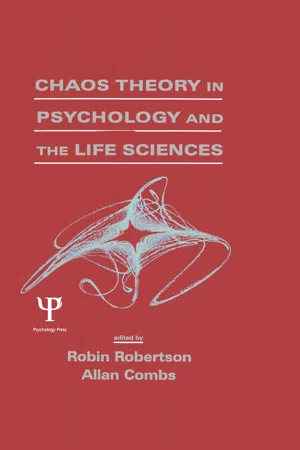
Chaos theory in Psychology and the Life Sciences
- 416 pagine
- English
- PDF
- Disponibile solo in versione web
Chaos theory in Psychology and the Life Sciences
Informazioni sul libro
This book represents the best of the first three years of the Society for Chaos Theory in Psychology conferences. While chaos theory has been a topic of considerable interest in the physical and biological sciences, its applications in psychology and related fields have been obscured until recently by its complexity. Nevertheless, a small but rapidly growing community of psychologists, neurobiologists, sociologists, mathematicians, and philosophers have been coming together to discuss its implications and explore its research possibilities. Chaos theory has been termed the first authentic paradigm shift since the advent of quantum physics. Whether this is true or not, it unquestionably bears profound implications for many fields of thought. These include the cognitive analysis of the mind, the nature of personality, the dynamics of psychotherapy and counseling, understanding brain events and behavioral records, the dynamics of social organization, and the psychology of prediction. To each of these topics, chaos theory brings the perspective of dynamic self-organizing processes of exquisite complexity. Behavior, the nervous system, and social processes exhibit many of the classical characteristics of chaotic systems -- they are deterministic and globally predictable and yet do not submit to precise predictability. This volume is the first to explore ideas from chaos theory in a broad, psychological perspective. Its introduction, by the prominent neuroscientist Walter Freeman, sets the tone for diverse discussions of the role of chaos theory in behavioral research, the study of personality, psychotherapy and counseling, mathematical cognitive psychology, social organization, systems philosophy, and the understanding of the brain.
Domande frequenti
Informazioni
Indice dei contenuti
- Cover
- Half Title
- Title
- Copyright
- Contents
- Foreword
- PART I: INTRODUCTION TO CHAOS THEORY
- PART II: RESEARCH METHODS AND CHAOS THEORY
- PART III: COGNITION AND CHAOS THEORY
- PART IV: EDUCATION, SOCIAL SCIENCE, AND CHAOS THEORY
- PART V: PSYCHOTHERAPY AND CHAOS THEORY
- PART VI: PHILOSOPHY AND CHAOS THEORY
- Biographies of Authors
- Author Index
- Subject Index